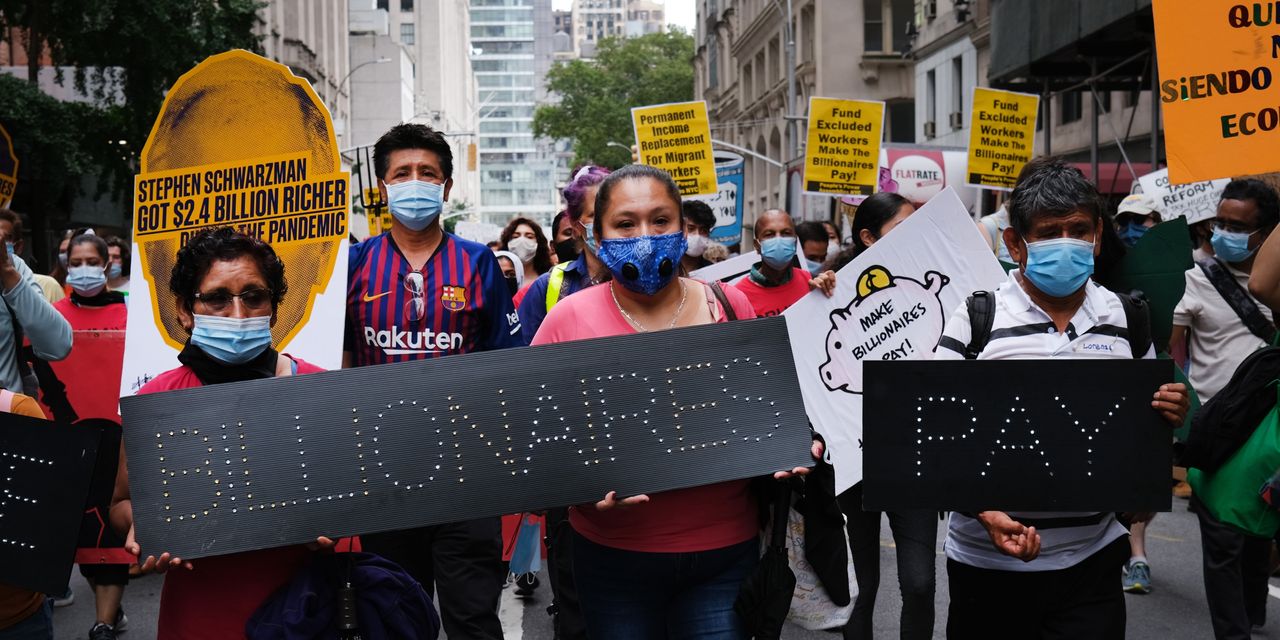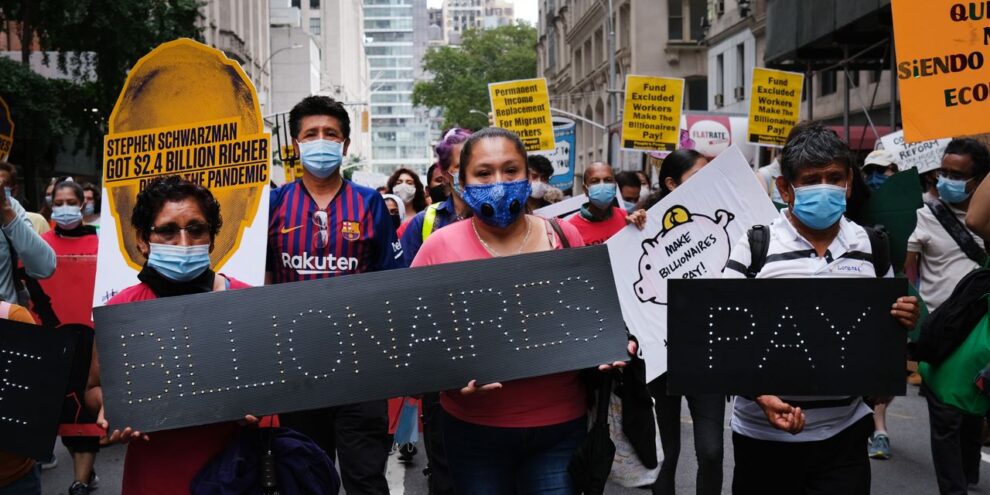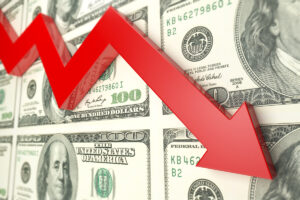
Wealth inequality in the United States is “more extreme and dangerous than income inequality” and could be alleviated by a federal wealth tax, a new report says.
The nation’s billionaires are almost a third richer than they were at the beginning of the COVID-19 pandemic in 2020, according to new calculations by the global charity Oxfam, which published the report this week. The number of U.S. billionaires is almost 60% higher than it was a decade ago, reaching more than 700, Oxfam said.
“The huge rise in pandemic wealth followed trillions of dollars being injected into financial markets to avert their collapse,” the report said. “This fresh cash, while vital to keeping economies afloat, ended up with the ultra-wealthy who were able to ride a stock market surge, without the guardrails of fairer taxation to share that wealth more equitably.”
See: Opinion: We should tax billionaires’ wealth to help pay for pandemic recovery
Also: Bernard Arnault is now worth $210 billion, extending lead over Elon Musk for world’s richest person
Meanwhile, Oxfam pointed to a “permanent underclass” in the nation, saying that almost a third of the U.S. labor force earns less than $15 an hour, with half of all working women of color earning less than that. In addition, the racial wealth gap has grown wider since the 1980s and is close to what it was in the 1950s, the report said.
Ahead of Tax Day next week, Oxfam presented five main arguments for a wealth tax:
- It would be a source of new revenue that could be invested in policies that help working families and women: Oxfam said a proposal by Sen. Elizabeth Warren, a Massachusetts Democrat, to tax billionaires alone would raise $114 billion annually — enough to reinstate the expanded child tax credit that gave qualifying families up to $3,600 per child in 2021 under the American Rescue Plan. That credit was shown to have reduced child poverty rates amid job losses, inflation and other economic concerns.
- It would help narrow the racial wealth gap: Eighty-six percent of total wealth in the U.S. is owned by white families, while Black, non-Hispanic families own just 3%, according to figures by the Institute on Taxation and Economic Policy (ITEP) cited by Oxfam. The report also cited research by various scholars who say that taxing the wealthy would help reduce racial wealth inequality, because white families are five times more likely than Black families to receive huge gifts and inheritances. “In the absence of progressive taxation, this creates a dynastic form of wealth, especially for the ultra-wealthy,” Oxfam said in its report. In addition, 92% of families worth over $30 million are white, non-Hispanic families, though they account for 59% of the U.S. population.
- It would help with the climate crisis: Oxfam cited two main arguments for this. First, the wealthiest people make the climate crisis worse through their investments and emissions, with “the investments of a sample of 125 of the richest billionaires [resulting] in a million times more emissions than the average person,” Oxfam said. Second, revenue from a wealth tax could help fund replacement of energy systems in the U.S., and could also be used to help victims of climate-induced harms like cyclones, famines and droughts around the world, the organization said.
- It would reduce the federal debt: Tax cuts since 2001 have added $10 trillion to the debt, according to figures by the Center for American Progress cited in the report. More than 80% of the tax cuts passed from 2000 to 2018 “went to the richest 40%, and most of it went to the richest 5%,” Oxfam said, citing an ITEP analysis. Oxfam added that proposed social-spending cuts to resolve standoffs over U.S. government debt usually disproportionately affect people living in poverty, namely women, girls and people of color.
- It would help protect democracy from oligarchy: “The ultra-wealthy and corporations now play a vastly outsized role in determining public policy in this country,” Oxfam said. For example, corporate lobbying last year rose to $3.5 billion, and accounted for 87% of all lobbying. Among the consequences of this, according to the report, are the preservation of tax cuts for the ultra-wealthy, still no movement on the federal minimum wage, and no reins on corporate stock buybacks.
Democratic lawmakers have long argued that the wealthiest Americans don’t pay their fair share in taxes, particularly after a 2021 ProPublica investigation of billionaires’ tax returns. A number of Democratic tax proposals in recent years have taken aim at unrealized capital gains of the ultra-wealthy, though some tax-law experts have raised concerns about the constitutionality of that approach.
President Joe Biden last year called for a “billionaire minimum income tax” that would require households worth more than $100 million to pay at least a 20% tax rate on their full incomes, including on unrealized gains. His budget proposal this year called for a 25% minimum tax on households worth more than $100 million. A separate 2021 proposal from Sen. Ron Wyden of Oregon called for taxing billionaires’ unrealized capital gains to pay for Biden’s later-shelved Build Back Better agenda.
Proposals to hike taxes on the wealthy have drawn Republican ire. Sen. Chuck Grassley of Iowa, for example, criticized Biden’s latest budget for what he called “its reckless taxes and out-of-control spending,” denouncing it as “a roadmap to fiscal ruin.”
Some U.S. billionaires, like Microsoft Corp. MSFT, -1.28% co-founder Bill Gates, Tesla Inc. TSLA, -0.48% Chief Executive Elon Musk and billionaire hedge-fund manager Leon Cooperman, have also pushed back against wealth-tax proposals, saying that they already pay their share of taxes; that they’re being vilified; and that such taxes could be illegal.
Also: Opinion: Why Elizabeth Warren’s wealth tax is a lousy idea
Other billionaires, however, have voiced support for such proposals: George Soros, Abigail Disney and more than a dozen other ultra-wealthy individuals wrote in a 2019 blog post that a wealth tax would be good for America, citing some of the same reasons Oxfam laid out in its report.
In total, Oxfam said, an annual net wealth tax could raise $582.6 billion each year by taxing more than just billionaires and using marginally higher rates: “2% for wealth above $5 million, 3% above $50 million, and 5% above $1 billion.”
Read next: Racial and economic inequality persists. Why do many people deny it?








